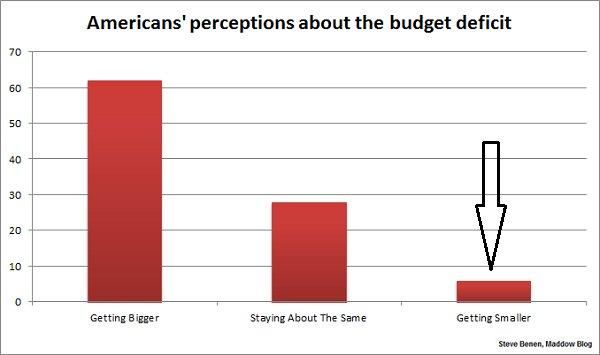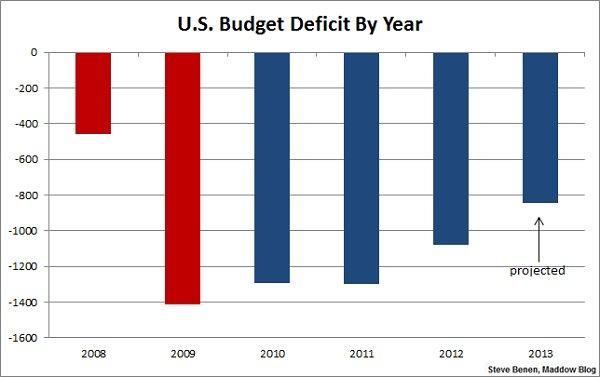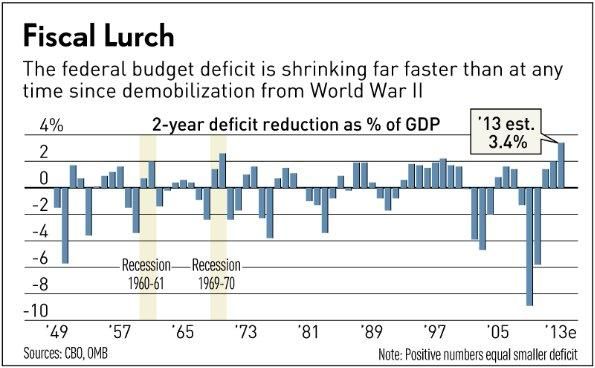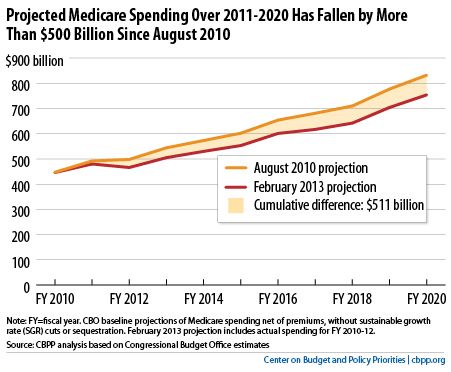One challenge for all of us as pragmatic progressives is the poor quality of the conversation on both the left and the right about this issue. The result was this depressing news that Steve Benen highlighted the other day.

What's depressing about that? Ninety-four percent (94%) of Americans are unaware of the fact that the federal deficit is actually getting smaller.

As a matter of fact, the deficit is shrinking at its fastest pace since World War II.

With this kind of success, the question you have to ask yourself is why the public doesn't know. Its clear that the Republicans don't want to talk about this because it would give President Obama credit for a victory on their main talking point.
But too many on the left don't tout this achievement because they don't think federal deficits matter and they're pissed that President Obama is clearly intent on doing something about it.
Liberals are right on this one in the short-term. Its understandable and justified that the federal government would engage in deficit spending in order to help the country recover from the worst economy since the Great Depression.
But the truth is that we DO have a problem in the long term.
But CBO’s long-term forecast projects that budget deficits will near the $1 trillion mark again by 2023, when it forecasts a $978 billion budget deficit...As Kevin Drum said recently: we don't have a spending problem, we have an aging problem.
The number of seniors receiving Social Security and Medicare benefits will rise by 40 percent over the next decade, Elmendorf said.
He also warned that waiting to change entitlement programs could mean failing to realize savings before aging baby boomers join the programs in full force.
So what's our real problem? That's simple: America is getting older and healthcare costs are rising. That means we'll need to spend more money in the future on Social Security and Medicare. There's simply no way around that unless we're willing to immiserate our elderly, and that's not going to happen.This is one of the reasons it was so important for President Obama to deal with health care reform as soon as possible. The best way to tackle our long term deficit problem is to tackle health care spending...especially Medicare. And this week we got some good news on that front.
The Center for Budget Policies and Priorities had charted a Medicare spending forecast made in 2010 and another three years later. The difference between the two is $511 billion.

So be sure to pass along the news about the shrinking federal deficit to your friends on the right. And when those on the left tell you its not a problem...ask them about the long term.




Great stuff. Shared.
ReplyDeleteI think you're missing the point. Of course the deficit is reducing and at a somewhat nice % basis because it exploded like never before as the economy collapsed with the housing and credit bubbles bursting. I don't give anyone credit for anything when the deficit is still over $1,000,000,000,000
ReplyDeleteNews flash...take a look at the chart. Its under $1 trillion this year ($845 billion) and projected to drop to $430 billion next year.
Delete